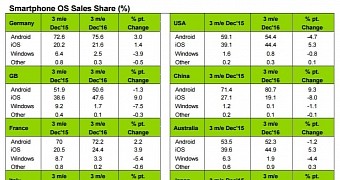It’s not a secret that Windows Phone is losing ground across the world, and now new statistics provided by Kantar confirm that Microsoft’s mobile platform is declining. But what’s worse is that Windows phones are no longer selling well in Europe, which has long been its strongest market.
In the EU5 region, Windows Phone declined from 7.2 percent sales share in the 3-month period ending in December 2015 to no less than 2.6 percent in the same period one year later, which is a drop of 4.6 percent. And if this is not worrying, let’s see what’s happening in the top European markets.
In Germany, Windows phones lost 3.9 percent, going down to no less than 2.5 percent, while in the United Kingdom, Microsoft’s mobile operating system lost a shocking 7.5 percent and is now at just 1.7 percent
A similar collapse was experienced in France as well, where Windows phones lost 5.4 percent to settle at 3.3 percent, while in Italy, the 2016 share is at 3.9 percent, down 4.3 percent. And last but not least, in Spain, Windows phones lost “only” 1 percent, but they’re now at 0.5 percent.
Non-European performance
Windows phones aren’t selling well in non-European markets either, so in Microsoft’s home market, the platform dropped to 0.8 percent, which is very close to the global market share that the company has in the mobile market at this moment.
Things are even worse in China, where Windows Phone is at just 0.1 percent share, but a little bit better in Australia, where it accounts for 1.9 percent of the sales during the period. In Japan, Windows phones are at 0.2 percent.
This isn’t obviously the first time Windows phones are losing ground and there’s a small chance to see the decline slowing down in the coming months, especially because Microsoft itself, which is the maker of Windows phones, doesn’t seem to be very keen on attracting more buyers.
In terms of market share, various companies put Windows Phone at about 0.5 percent market share, with forecasts estimating a decline to 0.1 percent share by 2020.

 14 DAY TRIAL //
14 DAY TRIAL //